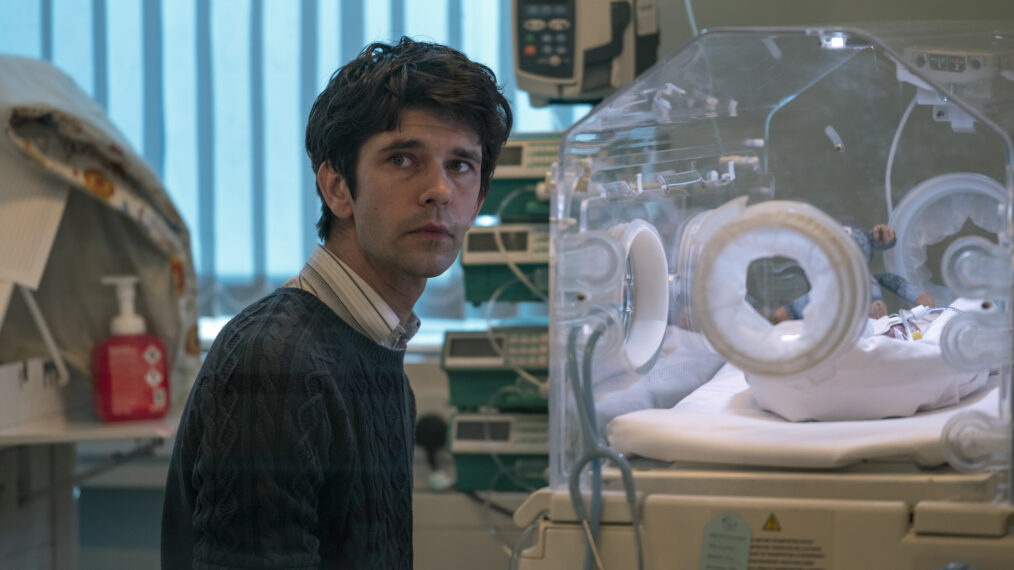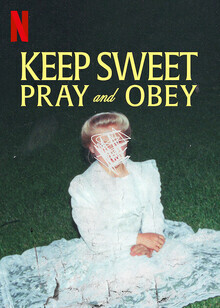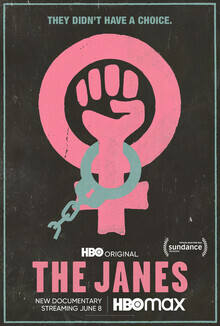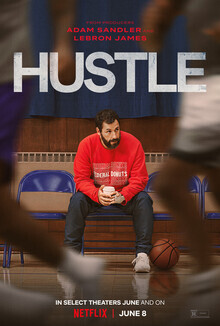
There are plenty of moments during the darkly comedic series “This is Going to Hurt” in which the viewer may want to look away. It does take place, after all, in an obstetrics and gynecology ward, and features all of its gory and gooey everyday sights. But this series, available on AMC+ on June 2 after premiering on the February 2 on the BBC, nonetheless draws the viewer like any regular highly entertaining TV series, with a tone specific to its setting. Ben Whishaw’s excellent performance as our central, flawed, and very tired doctor is only part of its charisma, which creates empathy by immersing us in his workplace.
The first episode, beautifully directed by Lucy Forbes, creates character at approximately 100 miles per hour, starting with Whishaw’s junior doctor Adam being late for work because he passed out in his car in the hospital parking lot. Before he even gets inside the building, he has to address one unusual emergency involving a woman and a baby more than ready to be born. From there the show, written by Adam Kay and based on his book, details how normal this situation is, and establishes how everyone working at the hospital is like a bickering family. Everyone has a caustic wit that has become a type of survival method, either when talking to patients or about each other. (The show's funniest moments are often in their passing digs.) We get to know the different people, like Shruti the trainee doctor (Ambika Mod) who gets a lot of things wrong before she gets them right; the watchful eye of head midwife Tracy (Michele Austin), and the leading doctor Mr. Lockhart (Alex Jennings), who rolls up in his fancy car every now and then to save the day, with a furrowed brow and intensity.
And then there’s Adam, who is constantly putting out fires, but still can miss a situation that's about to explode. That’s how the first episode poignantly reaches a climax that haunts him for the rest of the series, when one patient’s needs seem like crying wolf, until it becomes a life-or-death situation for a baby that is then born 15 weeks early. There can be little victories in this workplace for Adam and the others, but there’s hardly a sense of a permanent win. The most Adam gets sometimes is the ability to notch another line down in his locker, for the babies he helped deliver, often while having to then recycle his blood-covered smocks and get one from a vending machine with a limited supply. Or when a baby is born, he gets to say, "Adam is a good name" before moving on.

Adam’s personal life is its own stressful juggling act; he has a relationship with Harry (Rory Fleck Byrne), while at the same time not being out to his more conservative parents. All of it is made worse by the emotional unavailability created with work, which drags him away from parties, makes him late to dinners, and makes him even more isolated from Harry. In a worse way, it creates this helpless persona, of being so committed to his job. The people in his personal life don’t seem to understand, and the minor transaction is that he can at least offer a gory story for his friends' amusement at a dinner (that Adam is usually late for). It's all so lonely for Adam.
That restlessness becomes a gripping part of the series, applied to everything that he does. Sometimes Adam is doing what he thinks is right, sometimes he’s not thinking entirely straight, other times he does make the wrong decision. The show keeps the sense that it’s always because of everything else going on. And we see how that’s carried on by Mod's subtly heartbreaking performance, as Shruti's sense of self deteriorates parallel to getting better at her job and gaining more responsibilities, while studying for exams. With sharp editing and writing, the series balances both the intensity of the workplace with character development.
The roller coaster of going from one bizarre appointment to the next, never sure if one interaction will end with something of a gross-out gag or a life-or-death situation, can be exhausting. But that’s where the effective plotting of the series kicks in, as it creates different threads of that carry the viewer from one episode to the next, whether it’s about the premature baby, his relationship with Arthur, a complaint that could end his career, and in general the high stakes but casual life-saving work of the medical field.
At the center of it all is Whishaw’s vivid, electric performance, which shows how such stress creates a shell for someone like Adam. He creates an inner intensity that also details how someone could be so giving in their work passion, and continually push down their own needs. His eyes get wearier as the show goes along, and his wit is more and more of a defense mechanism, or a way to get a brief dig back at whatever absurdity is in front of him. It's such an insightful performance that it doesn't need the fourth-wall breaking edge the series also gives him, which feels like a "Fleabag"-inspired approach not fully realized by this production.
One of the most poignant aspects of the series concerns how it doesn’t take a lot of time to ruminate on why Adam, Shruti, Tracy, and others do what they do, one overlong shift after the next. There’s always some surplus of wanting to help that everyone draws from, even more than the desire to be right or to beat the latest medical problem. But there’s no time for such monologues, and the series just treats that desire like a fact, the same way it looks straight-on at Cesarean procedures, wanting to normalize many different experiences of birth. As it takes the viewer on a sometimes relentless, exhausting, but fascinating ride, “This is Going to Hurt” is more about recognizing whether a fellow human being can keep doing this work when it takes so much.
All of season one screened for review. "This is Going to Hurt" premieres on AMC+ on June 2 with a new episode each week.
Nick Allen is the Senior Editor at RogerEbert.com and a member of the Chicago Film Critics Association.





